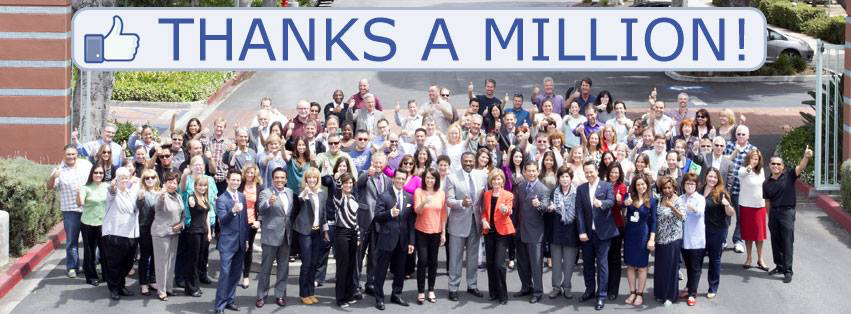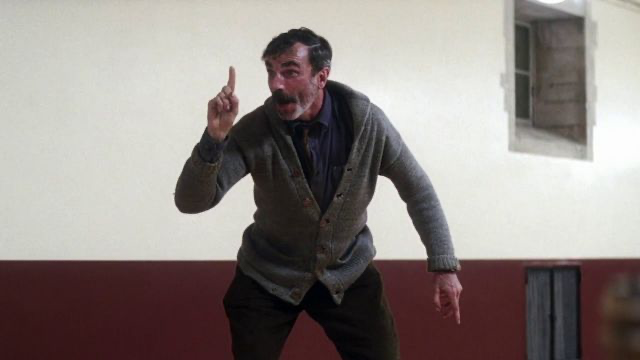the new TV
Ten years ago, the employees of a TV station in Los Angeles took a group photo to celebrate their 1 millionth follower on Facebook.

They were a very productive station. Maybe you can tell by the number of people working there.
But what exactly does a local TV station produce?
About four hours of news shows every day?
Great guess! But, wrong. (Don't worry, it's a common misconception.)
Those four hours of people talking is just bait. Most of it gets thrown away every day and is never reused!
So what then does it produce?
Your time!
The amount of time that you spend watching is what a TV station produces.
(Let's call the product "audience time.")
The year that this photo was taken, those 107 workers produced about four hours of bait video each day that was then consumed by around 750,000 people daily.
That's a lot of people! But how much audience time is that? Because that's the product!
To be counted as a viewer, you have to watch as little as five minutes. Should we say those .75M only watched 5 minutes every day?
No! Let's be generous! Let's assume that those .75M daily viewers watched 30 minutes daily.
That adds up to around 375,000 hours of audience time every day!
Wow.
Every one of those 107 workers produced 3,505 hours of audience time on a daily basis. Amazing.
For every hour they worked, they produced 438 hours of audience time. That's 438x!
What a team!
No wonder they're smiling in the photo.
But not me.
I wish I could be happy but I'm a capitalist.
There is a hole deep down inside of me that can never be filled.

What would make me happier is helping these workers become even more productive!
(And if they're more productive, surely they'll have to work less hours each week!)
But how can we make them even more productive?
We could give them better tools! Or better information! Or training!
But that all costs money. And we have a business to run here. It's not a charity!
We want to double their output but still keep costs the same.
(We could cut their salaries in half but then they might leave…)
Wait. Didn't we say they were doing amazing work?
What if they just did amazinger work?
I'm sure they can! One million followers on Facebook is just the start!
I believe in them. Now they need to believe in themselves.
We just have to inspire them to come up with solutions, to be inventive and creative – from the ground up!

So we'll fire half the company. And allow the remaining half to decide how to do without.
Now, some of you are probably thinking: "Hey! That's not fair!"
But you're the one being unfair! Look at what they've already achieved!
These are not dumb people! They're very smart. They're going to figure this out.
And when they do, they'll be even happier because: they did that!
So, who should we fire?
If we randomly fire people we'll surely reduce the amount and/or quality of bait television we produce, which will then reduce the amount of audience time we produce.
We need to keep the output the same – so let's leave everyone who stands in front of, or behind a video camera, as well as everyone else who supports them directly.
That leaves us with about 50 people.

Look at all those thumbs ups! Now that's the spirit!
Each and every one of these incredible team mates is now going to produce 7,500 hours of audience time every day!
For every hour of their labor they put in, a whopping 938 hours of audience time comes out!
938x!
Imagine if a task that took you 15 hours to complete could be done in just 1 minute?
You'd be delighted, wouldn't you?
You would!
Not me.
Nope. Because I know we can do better. 938x was just a test.
What we need are workers capable of producing 10,000 hours of audience time every hour.
Can you imagine what such a worker looks like?
Yes you can!

Meet Leo Gonzalez, the young man on the left. He's a "digital content creator".
Leo has around 3m followers on TikTok and another 1M on Instagram.
Leo has a lot of followers because his videos are watched a lot.
If we only count the ones he made last year, they were watched about 293 million times.
Since his typical video is a minute long, Leo produced around five million hours of audience time last year.
And since he's only making one minute of bait a day, he's probably only working two hours a day.
That means Leo produces 11,000 hours of audience time every hour that he works.
He's 10x more productive than the TV factory workers who lost half their colleagues!
And unlike them, Leo only works a few days a week; he basically had a two month vacation last year.
Now, just imagine if you had 50 Leo's working for you. Every day! Or 107 of them!
What if you had like tens of thousands or even millions of potential Leo's all willing to generate a few extra hours of audience time every day for you. And you didn't have to pay them!
Imagine what that would do to your margins.

Yes, there's a difference between comedy skits and local news as bait.
But it's a difference of tone, not kind.
Here is a video of Leo being invited to a local TV station. And here's another, and another, and another, and another. (They sure see him as one of their own.)
The reason why Leo is 10x more productive than his TV station counterparts is in large part technological.
There has been a revolution in the production of audience time in the last 20 years.
See for yourself:

I made this chart at work a few months ago. It tracks the number of handheld video cameras sold since 1999 that connect freely to global video networks.
(Of course, it's a gross simplification. Because these camera-transmitters also come with built-in video editing stations and graphics generators and news wires and weather services and so forth, and so on.)
We could tell ourselves that none of this is surprising. Technology responds to human instincts. It follows the flow of capital.
But it also changes us.
In ways that we don't fully understand, at first.
Until the next time!
I'm sorry, that's all the time I have this weekend.
As always, thank you for your time!
I really look forward to hearing from you.
p.s.
This image of Leo comes from his first TV acting gig. I hired him to be on a show I created with the intent of reinventing TV. It's a long story but tldr; what matters most is that people are happy. Can a factory produce happiness? I think so. If you're a fellow capitalist, HMU!